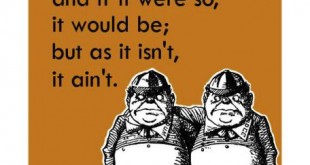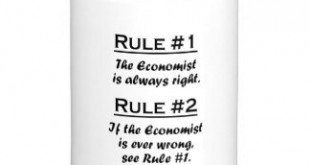Additivity — a dangerous assumption The unpopularity of the principle of organic unities shows very clearly how great is the danger of the assumption of unproved additive formulas. The fallacy, of which ignorance of organic unity is a particular instance, may perhaps be mathematically represented thus: suppose f(x) is the goodness of x and f(y) is the goodness of y. It is then assumed that the goodness of x and y together is f(x) + f(y) when it is clearly f(x + y) and only in special cases...
Read More »Axiomatic economics — the Bourbaki-Debreu delusion
Axiomatic economics — the Bourbaki-Debreu delusion By the time that we have arrived at the peak first climbed by Arrow and Debreu, the central question boils down to something rather simple. We can phrase the question in the context of an exchange economy, but producers can be, and are, incorporated in the model. There is a rather arid economic environment referred to as a purely competitive market in which individuals receive signals as to the prices of all goods. All the individuals have...
Read More »Fadime Sahindal
Till Fadime Sahindal, född 2 april 1975 i Turkiet, mördad 21 januari 2002 i Sverige I Sverige har vi länge okritiskt omhuldat en ospecificerad och odefinierad mångkulturalism. Om vi med mångkulturalism menar att det med kulturell tillhörighet och identitet också kommer specifika moraliska, etiska och politiska rättigheter och skyldigheter, talar vi om normativ multikulturalism. Att acceptera normativ mångkulturalism, innebär att också tolerera oacceptabel intolerans, eftersom den normativa...
Read More »Sacrifice
[embedded content]
Read More »Kvinde min (personal)
[embedded content]As always, for you, Jeanette Meyer
Read More »‘Deep parameters’ and microfoundations
‘Deep parameters’ and microfoundations In a post last week, Simon Wren-Lewis was discussing if modern academic macroeconomics is eclectic or not. When it comes to methodology it seems as though his conclusion is that it is not: The New Classical Counter Revolution of the 1970s and 1980s … was primarily a revolution about methodology, about arguing that all models should be microfounded, and in terms of mainstream macro it was completely successful. It also tried to link this to a...
Read More »Still No. 1 (personal)
Still No. 1 (personal) [embedded content]
Read More »Axiomatics — the economics fetish
Axiomatics — the economics fetish Mainstream — neoclassical — economics has become increasingly irrelevant to the understanding of the real world. The main reason for this irrelevance is the failure of economists to match their deductive-axiomatic methods with their subject. The idea that a good scientific theory must be derived from a formal axiomatic system has little if any foundation in the methodology or history of science. Nevertheless, it has become almost an article of faith in...
Read More »The gussied up economics of Tweedledum and Tweedledee
The gussied up economics of Tweedledum and Tweedledee “Of course, there were exceptions to these trends: a few economists challenged the assumption of rational behavior, questioned the belief that financial markets can be trusted and pointed to the long history of financial crises that had devastating economic consequences. But they were swimming against the tide, unable to make much headway against a pervasive and, in retrospect, foolish complacency.” —Paul Krugman, New York Times...
Read More »Wren-Lewis and the Rodrik smorgasbord view of economic models
Wren-Lewis and the Rodrik smorgasbord view of economic models In December 2015 yours truly run a series of eight posts on this blog discussing Dani Rodrik‘s Economics Rules (Oxford University Press, 2015). There sure is much in the book I like and appreciate. It is one of those rare examples where a mainstream economist — instead of just looking the other way — takes his time to ponder on the tough and deep science-theoretic and methodological questions that underpin the economics...
Read More » Lars P. Syll
Lars P. Syll








